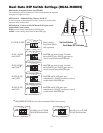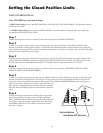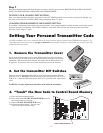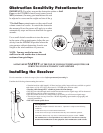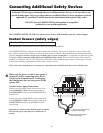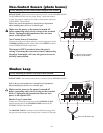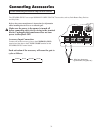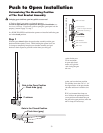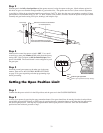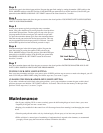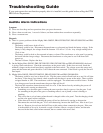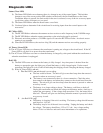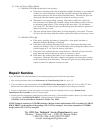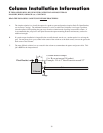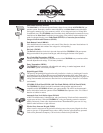36
Diagnostic LEDs
Status (Clear LED)
1) The Status LED blinks once whenever there is a change in any of the control inputs. This includes
changes to any of the seven position DIP switches on the board, the Set Limit Button or the Learn
Transmitter button is pressed, the limit switch in the arm is activated, or any of the six accessory inputs
(cycle/close, safety, exit/open, etc.) are used.
2) The Status LED flashes when the board learns a new limit.
3) Use these lights to determine if the circuit board is receiving inputs from the control inputs or the
accessories.
RF (Yellow LED)
1) The RF LED flickers whenever the antenna receiver receives a radio frequency in the 318 MHz range.
2) The RF LED flickers when the remote transmitter or the wireless keypad is activated.
3) Electronic noise that produces a 318 MHz signal will cause the RF LED to flicker. An electric motor
running is one example.
4) When the RF LED flickers, the receiver chip (U8) and the antenna receiver are working properly.
AC Power (Green LED)
1) The AC Power LED stays on whenever the transformer is putting out voltage to the circuit board. If the AC
Power LED is off, there is no power from the transformer.
2) The AC Power LED does not come on when the battery is charged by solar panel without the transformer or
when the transformer is unplugged.
Red LED
1) The Red LED comes on whenever the battery is fully charged. Any time power is drained from the
battery to operate the gate; the light goes off until the battery is fully charged again. Under normal
operations, the light will cycle on and off indicating the charging circuit is keeping the battery charged.
2) If the AC Power LED is on and:
1. Éthe Red LED is on and the unit is not working.
a. The fuse could be blown. The unit will give one short beep when the remote is
pressed or when an accessory is used.
b. The battery is not connected or there is a loose connection. Check the wires
that connect to the battery and where they connect to the circuit board from the
battery. The unit will give one short beep when the remote is pressed or when an
accessory is used.
c. The battery is no longer taking a charge. The battery could have a dead cell.
Unplug the transformer and check the voltage on the battery under a load (try to
operate the gate opener). If the voltage drops more than 1 vdc, the battery has a
dead cell. The unit will give one short beep when the remote is pressed or when
an accessory is used.
2. ...the Red LED is off.
a. The battery is charging if the unit is working. The battery voltage should increase
until it gets to 14.5 vdc.
b. The battery may be low if the unit is not working. Unplug the battery and check
the voltage. The battery should have 12.5 to 13.5 vdc. Any voltage reading
below 12 vdc is a little low and could cause intermittent or no operations.



